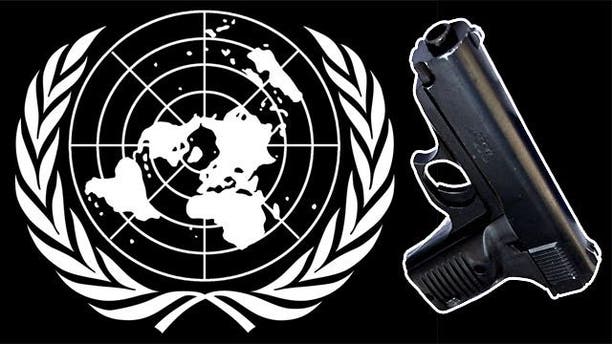Vatic Note: Here is my problem with this. Like Global warming, the whole point of these pieces of legislation is never the so called compassionate well being of the general population as we have seen time and again. The purpose is "money" and control, and especially control, and the UN and its signatories are notorious for hidden agendas that have nothing to do with saving lives.
Remember, these are the same people who want depopulation down to 500 million, and that is in writing. So, how come depopulation proponents want to sign such a bill when it fits perfectly into thier depopulation agenda? Gun deaths are another tool in the depopulations arsenal of ways to depopulate the planet for greater control over that population.
What they really want is gun control so resistance is toothless and they will have complete control and can do away with the resisters and Christians that they hate so much, just like they have done in the past.
Kerry to sign UN arms treaty, despite senators' opposition
http://12160.info/forum/topic/show?id=2649739%3ATopic%3A1323298&xgs=1&xg_source=msg_share_topic
Posted by James, admin, 12160 Info
Sept 25, 2013
Secretary of State John Kerry plans to sign a controversial U.N.
treaty on arms regulation on Wednesday, a senior State Department
official told Fox News -- despite warnings from lawmakers that the
Senate will not ratify the agreement.
A State official said the treaty would "reduce the risk that
international transfers of conventional arms will be used to carry out
the world's worst crimes," while protecting gun rights.
"The treaty builds on decades of cooperative efforts to stem the
international, illegal, and illicit trade in conventional weapons that
benefits terrorists and rogue agents," the official said.
U.S. lawmakers, though, have long claimed that the treaty could lead
to new gun control measures. Sen. Jim Inhofe, R-Okla., one of the most
vocal opponents of the treaty, sent a letter to Kerry declaring it "dead
in the water," since a majority of senators has gone on record against
the agreement.
"The administration is wasting precious time trying to sign away our
laws to the global community and unelected U.N. bureaucrats," he wrote.
Kerry, who is in New York attending the U.N. General Assembly
session, announced earlier this year that the administration planned to
sign the treaty.
The treaty would require countries that ratify it to establish
national regulations to control the transfer of conventional arms and
components and to regulate arms brokers, but it will not explicitly
control the domestic use of weapons in any country.
Still, gun-rights supporters on Capitol Hill warn the treaty could be
used as the basis for additional gun regulations inside the U.S. and
have threatened not to ratify.
Over the summer, 130 members of Congress signed a letter to President
Obama and Kerry urging them to reject the measure for this and other
reasons.
The chance of adoption by the U.S. is slim. A two-thirds majority would be needed in the Senate to ratify.
What impact the treaty will have in curbing the estimated $60 billion
global arms trade remains to be seen. The U.N. treaty will take effect
after 50 countries ratify it, and a lot will depend on which ones ratify
and which ones don't, and how stringently it is implemented.
The Control Arms Coalition, which includes hundreds of
non-governmental organizations in more than 100 countries that promoted
an Arms Trade Treaty, has said it expects many of the world's top arms
exporters -- including Britain, Germany and France -- to sign alongside
emerging exporters such as Brazil and Mexico. It said the United States
is expected to sign later this year.
The coalition notes that more than 500,000 people are killed by armed
violence every year and predicted that "history will be made" when many
U.N. members sign the treaty, which it says is designed "to protect
millions living in daily fear of armed violence and at risk of rape,
assault, displacement and death."
Many violence-wracked countries, including Congo and South Sudan, are
also expected to sign. The coalition said their signature -- and
ratification -- will make it more difficult for illicit arms to cross
borders.
The treaty covers battle tanks, armored combat vehicles,
large-caliber artillery systems, combat aircraft, attack helicopters,
warships, missiles and missile launchers, and small arms and light
weapons.
It prohibits states that ratify it from transferring conventional
weapons if they violate arms embargoes or if they promote acts of
genocide, crimes against humanity or war crimes. The treaty also
prohibits the export of conventional arms if they could be used in
attacks on civilians or civilian buildings such as schools and
hospitals.
In addition, the treaty requires countries to take measures to
prevent the diversion of conventional weapons to the illicit market.
This is among the provisions that gun-rights supporters in Congress are
concerned about.
Fox News' Nicole Busch and The Associated Press contributed to this report.
The article is reproduced in accordance with Section 107 of title 17 of the Copyright Law of the United States relating to fair-use and is for the purposes of criticism, comment, news reporting, teaching, scholarship, and research.

No comments:
Post a Comment